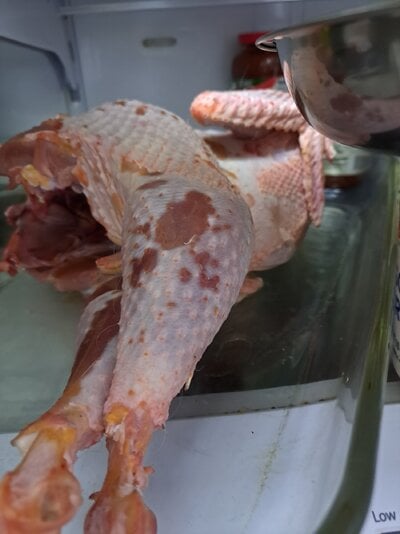bockerchickens
In the Brooder
- Sep 16, 2023
- 33
- 42
- 41
Butchered my first chicken, a rooster that needed to go. Used a cone and a pen blade knife I bought on Amazon.
I believe I didn't quite cut deeply enough as it took a little while longer than expected for the poor bird to completely pass (next time, I'll try to strike deeper. I expected the blade to be sharp enough to do most of the work, but it wasn't).
Concern 1: from the picture (1 day post butcher): Did all the blood get out or what are those spots on the chicken that look redish?
Concern 2: I nicked the intestines, it was getting dark, and I ended up smearing some of it on a wing. I cleaned it all out very thoroughly in the post-op.
Concern 3: Something greenish came out of the bottom of the chicken while I was trying to pull out the intestines. That doesn't seem right. What was it, and how do I avoid it in the future? Again, I cleaned out the bird really well afterward with water, etc.
Based on all of the above-will this chicken be safe to eat or, did he die so I can learn what not to do?
I have a second rooster that needs to go as well, so learning for future purposes.
I believe I didn't quite cut deeply enough as it took a little while longer than expected for the poor bird to completely pass (next time, I'll try to strike deeper. I expected the blade to be sharp enough to do most of the work, but it wasn't).
Concern 1: from the picture (1 day post butcher): Did all the blood get out or what are those spots on the chicken that look redish?
Concern 2: I nicked the intestines, it was getting dark, and I ended up smearing some of it on a wing. I cleaned it all out very thoroughly in the post-op.
Concern 3: Something greenish came out of the bottom of the chicken while I was trying to pull out the intestines. That doesn't seem right. What was it, and how do I avoid it in the future? Again, I cleaned out the bird really well afterward with water, etc.
Based on all of the above-will this chicken be safe to eat or, did he die so I can learn what not to do?
I have a second rooster that needs to go as well, so learning for future purposes.




